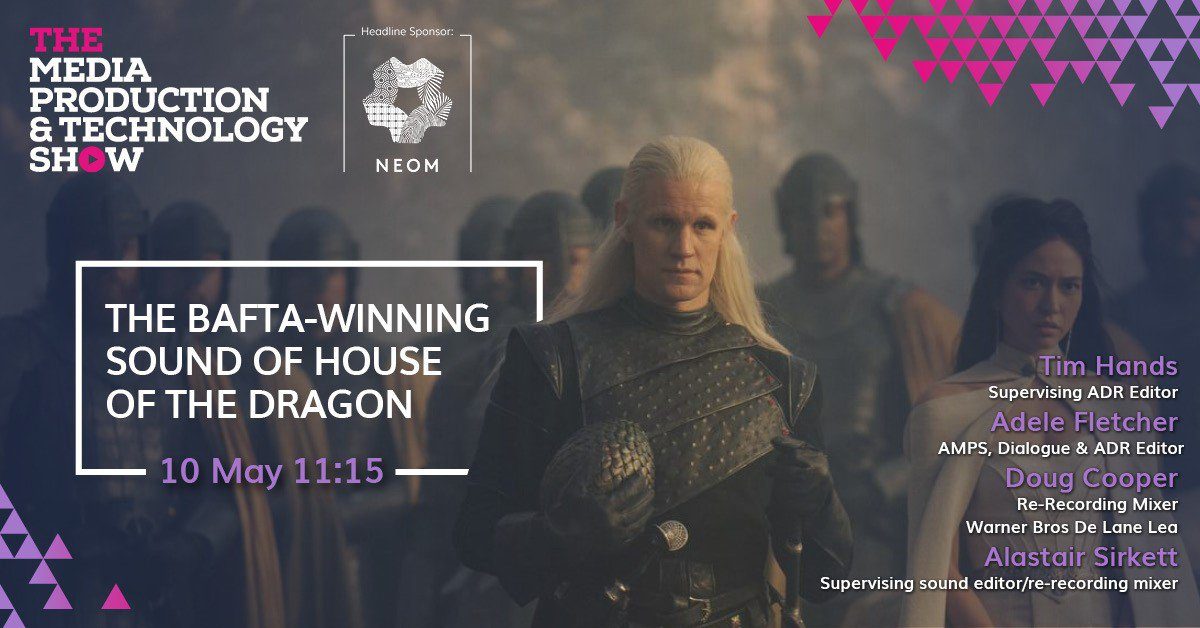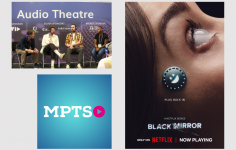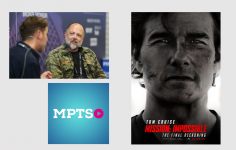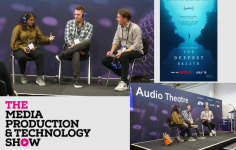At the Media Production and Technology Show 2023, Resurface co-founder Ben Nemes spoke with the BAFTA-winning sound team behind HBO’s House of the Dragon.
In the weeks since the conversation took place, two significant things have happened. Firstly, the the sound of House of the Dragon received an Emmy nomination. Secondly, the American actors’ union, SAG-AFTRA, began their strike, bringing into sharper focus the AI question later in the interview.
The full recording of that interview can be found here:
A full transcript is below:
Ben Nemes (00:00): Welcome to the Media Production and Technology Show 2023. Day one, session one. I’m your host for this first session. My name is Ben Nemes and I’ll introduce our panel in a moment.
Before I do, a couple of bits of admin for questions. So – if any of you have questions that occur to you as you are watching the presentation, there’s a thing called Slido – www.slido.com – The event code you’ll need is #MPTS2023. And if you submit questions on that, we can put questions to the panel at the end.
So it’s my great pleasure to introduce you to our panel this morning. Recently awarded the BAFTA for Best Sound, fiction – for their work on the sound of House of the Dragon for HBO. I give you Adele, Al, Doug, and Tim.
The thing to do first is, if I could ask you to introduce yourselves – and maybe put in context your role within that award-winning sound team.

Adele Fletcher (01:13): Hello, everyone. My name’s Adele Fletcher. I’m a dialogue and ADR supervisor. So I cut the dialogues and did some ADR as well.
Al Sirkett (01:22): I’m Alastair Sirkett, I’m the Supervising Sound Editor. So I oversaw the whole post sound process, working with and getting the team together.
Doug Cooper (01:34): My name’s Doug Cooper, I’m the re-recording mixer. So, once these guys have done all the sound editorial process, all their material comes into the studio and we premix, final mix and deliver the final sound for the show.
Tim Hands (01:49): I’m Tim Hands. I’m a dialogue and ADR Supervisor. I took care of some of the production dialogue, a lot of the ADR and most of the group recording that was done for all the background actors.
Ben Nemes (02:01): Thank you all very much. I think maybe the place to start would be to put this particular show in its historical context.
I know you guys are about to get onto the second season. But if you go back to Season One, Episode One, and that time in between Game of Thrones and House of the Dragon. I think New Yorker magazine described it as “a black hole in the zeitgeist”? You had this gargantuan global phenomenon that was Game of Thrones, that had ended – and for some it hadn’t ended satisfactorily!
So there’s this whole scene around that show and then.. a gap. And then you come to House of the Dragon as a prequel with an enormously expectant and enormously.. what’s the word?
Al Sirkett (02:56): No pressure at all!
Ben Nemes (02:57): Well, this is it. To use another HBO-ism: Big Shoes.. Big…Shoes! Tim, you are common to both shows, is that right?
Tim Hands (03:08): Yeah. I’m guilty of Game of Thrones since the pilot, which nobody’s seen, but I did!
I think the difficult thing was Thrones coming to an end, which was a big hole. But also then, coming into House of the Dragon, there was a big expectation of what it was going to sound like, how it was going to be.
Tim Hands
Will it stack up? Not just in terms of a show in itself, obviously there’s a massive fan base out there for that, but also how we were going to handle the sound and what would it be?
And I think my understanding was, that when it returned to the screens, there had to be a sense of ‘we are back’. So we had to have a feel to it that reminded people where it had come from. It had to have a feel. I mean, notwithstanding it was set 200 years earlier; so there’s bound to be some differences, but the sense that it was ‘Game of Thrones is back’.
Al Sirkett (04:16): Apart from being told it was I was being given season nine Game of Thrones for a season one budget <Laugh>
It’s a real kind of nice pressure way to start a job! But it was very much, from the showrunner’s point of view, the audience needs to immediately feel comfortable. And that was the way it’s shot and Ramin’s music, and all these things. But I was told to bring us together. And that’s why Tim was on. I wanted someone who’d been through it, and Paula – the lady who did all our dragon sounds for us who’d both been on Game of Thrones. It was, as I described it at the time, the DNA of the Dragons had to be brought forward so they understood – and they’d been through this massive juggernaut of a show and everything that entails. To make people feel comfortable. So within a couple of minutes of watching it, they were aware, okay, I’m back in the same place. I feel that vibe.
Ben Nemes (05:07): We should probably mention Paula, the one member of this team that couldn’t join us this morning. She has the temerity to live in Los Angeles …
Panel (05:18): Palm Springs!
Ben Nemes (05:20): OK – still not on the district line, is it? <Laugh>. And so we need to recognize…
Tim Hands (05:26):…the Mother Of Dragons.
Ben Nemes (05:27): And speaking of recognizing sound people, it occurs to me that I’ve done something terrible. I’m going to do this right now. We’re a bit late. We’re going to say thank you and we are going to acknowledge Alex for doing our sound today and tomorrow. No other theatre in this place is going to do that, by the way. It’s only the audio theatre! Be the change you want to see! <laugh>
So going back to your point, Al. Your role in putting together the crew, putting together the team. Can you explain how that works?
Al Sirkett (06:08): My pitch for the job to the showrunners was to have Paula on, as someone who understood the Dragons. ‘Cos for House of the Dragon, there was always going to be a lot more dragons! And I really wanted her and loved her work on it as, as I’d loved Tim’s work with the crowd, and everything he’d done with Game of Thrones as well.
And I knew that having them there would support me. And then it was a matter of going to Doug, because Doug was my first choice of someone to mix it. And bringing Adele on as well. I’ve worked with her on various jobs. It’s surrounding yourself with people who you trust. I found myself in a weird situation of being a rerecording mixer as well, which was never really the plan at the beginning.
And I thank Doug for not throwing things at me while I was mixing by the side of him. So to do that, and to have the overview of it – I’d not really worked in TV before either. I’d mainly worked in features, so it was a whole new experience. But the HBO family and the producers that were there as post production supervisors were phenomenal and supportive.
I think we all felt like we were this family working for the common good. And that was amazing. And Ida O’Rourke who’d been on Game of Thrones as well, who Tim knows very well, was just phenomenal in supporting us to get through what was the first season of a new show. Not the first season of a small show, but first season of a show which was huge.
Al Sirkett
As they described it: It doesn’t have any brakes! <laugh>. Once you’re going, you’re going, there’s no “Okay, we’re just gonna sit back and have a look at this”. You’ve just gotta keep plowing along.
Ben Nemes (07:51): I’m fascinated by this idea of consistency between Game of Thrones and House of the Dragon, that it has to be the same. You have to occupy the same sonic universe and it has to be that that carried-over world. The same, but completely different. Is that kind of the brief?
Al Sirkett (08:15): Yeah, I was told it had to feel like you were in the same world, but at no point was I told you need to make the doors the same, make the room sound exactly the same, make the birds the same as it was.
I don’t know if I ever told Tim, up until I got the gig – I’d never actually watched Game of Thrones. And then very quickly watched Seven seasons <laugh> very quickly!.
I didn’t watch Season eight. I’d heard stories so… <laugh>. But for me that was not watching it and listening intently to each individual thing. It was experiencing it, like a punter, how I felt about it and how I thought sonically we could all work together and mix. Again, the music does a lot. It’s Ramin’s music that’s very much Game of Thrones. That’s the sort of the standout thing.
And then, as a sound crew we get our chances to do things. Battle of the Bastards and stuff like that was very sonically interesting and done in a different way. They’d obviously spoken a lot to the sound crew about that and how they were gonna approach it and how it’s gonna get done. So it’s following those big things as well to try make it feel the same.
Ben Nemes (09:31): And just thinking, from Adele and Tim’s part of it, specifically how that manifests, with dialogue and with ADR and that kind of same-but-different approach to the show?
Doug Cooper (09:48): Just to preface that. We were originally told that there would be no ADR in the show at all.
Ben Nemes (09:53): Zero?
Doug Cooper (09:54): Zero. That was the original intention. But I think, we sneaked a few bits and pieces in, but not very much. The showrunners were very wedded to production sound and the original performances of the actors.
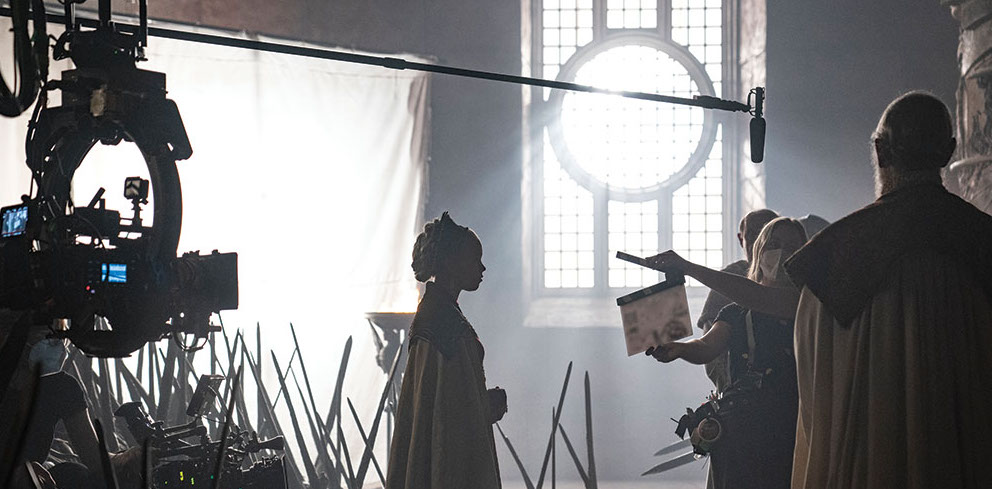
Ben Nemes (10:10): And when you know that the preference is to not shoot ADR, how does that manifest in terms of your approach to the show? I mean – you can’t be there with a boom and a clip and making sure it’s not needed. So, when you are told that, how do you ensure that you can live up to that?
Doug Cooper (10:30): Just, you just keep polishing, you just know you have to work with the tracks you’re given. You can augment things with tiny clips of ADR; phrases, a word or a syllable. But you just have to be aware that what you are given, that’s what you’ve got to work with.
So you have to just go through all the passes of polishing it as much as you can, keep chipping away to get it the best that it can be. And then also that feeds into the effects tracklay and the background tracklay specifically. Because then you can feed back about how much you know you’re going to need in terms of what’s going on around the dialogue. So you don’t hear all the bumps in and out amongst the background noise.
Adele Fletcher (11:15): But in a way it kind of also makes you step up with the ADR role. Because we wanted to deliver ADR that was tempting for the showrunners to use, because we did get some in!
Ben Nemes (11:27): “Are you Sure you don’t want ADR…? Even this stuff?!”
Tim Hands (11:32): The thing is making sure that the actors actually want to do it and do it right. The thing is, if you get a gargantuan list of ADR for the actors to do – the first thing they’re gonna do is look at that list and just go, “oh”. You get one or two go “oh I love doing this”. But most are just gonna go “…argh…”
Adele Fletcher (11:47): “Really … do you really need this?”
Tim Hands (11:50): Actually, if you target it and say we are gonna use this, and really make sure that you get the performances that match melodically what’s on the screen, then firstly you’ve got a good chance of replacing it instead of production. But also then if you’re gonna use it to enhance, like Doug was talking about – syllables or words – if the performance is very close musically, the projection’s right, then it’s gonna be easier to fit it in.
If you let something be less projected, if you go softer, or you let the line go down at the end when it actually was an uplift at the end of the line, the first thing that’s gonna happen is the showrunner, or the film editor, is gonna listen to it and go, “well that’s different”. So their immediate reaction is, I don’t want it ‘cos it’s not what I’m used to. So you have to work really hard to get it the same or so close. The other thing is …don’t tell ’em!
Tim Hands, on ADR
Is as soon as you tell them, even though they go “Oh this is great, this is great. Oh it’s ADR? Right… Get it out”. You get that sort of thing. So it’s really important that we work hard at it.
Ben Nemes (12:53): And that decision, that kind of edict around not using ADR – Do you know what the impetus was behind that? Is that budgetary? Is that creative? Is that just a stylistic thing of a director.
Al Sirkett (13:05): The showrunner had directed three of the episodes, and loved his on-set performances, that was pretty much it.
Ben Nemes (13:11): An unwavering belief that it’ll never ever be as good as onset?
Al Sirkett (13:14): I don’t think there’s that. He absolutely allowed us – And there were certain times where we mixed and he said, great, that’s production? Doug would say, no, there’s some ADR in there. To his benefit, he never pushed us back and said, okay, I just want production – We’ve been on jobs like that – but he never did that. He was like, okay. And he’d get into it.
I think it’s that separation of when they’re editing, when they’re sitting with the editor and working and they’ve lived it 500 times, they know every little up and down of the voice and everything. So it’s a matter of trying to get the ADR to match as best as possible. So you do, as Tim says, the musicality of it and the flow of the delivery and then Doug getting it to work.
Ben Nemes (13:58): I was gonna say that’s got to be a team effort, right? Because there’s an extent to which that’s you guys, your problem – and an extent to which that gets passed along the chain and becomes Doug’s problem?
Tim Hands (14:06): We’ve done this Doug, what can you do with it? It’s all on you, mate.
Ben Nemes (14:09): I might have made it worse. Have that!
Al Sirkett (14:14): There were two or three scenes that were bad, not badly recorded, but just had a lot of problems that had to be worked on: Tim would do a bit on it, then it would come to us. Doug would have a go. It’s eeking out little bits where you can, rather than everyone getting Izotope RX and going, well I’ll just clean that up and then we’ll move forward. Tim’s got some clever tricks. Doug’s got some clever tricks. Adele’s got some clever tricks. It’s just eeking away to get the best you can from it
Doug Cooper (14:41): And Al goes, no, take that out!
Al Sirkett (14:44): It got to that stage where I would sit there and the ADR lists would come in and I knew how much we were gonna get away with.
So I’d sit with Doug and we’d go through the ADR list and I would sit there being the supervisor and say, “That’s all down for ADR?” We’d have listen to it in the theater and I’d go “Alright, we’re not shooting that” And I just had to chop these lists down because a showrunner would see these lists and go, “Why have they got 10 pages of ADR?” I’d say, okay, I’ve got it down to three. “Okay, well we’ll shoot three”. But that, again, was a team effort. I’d go back and say this is acceptable. That’s not acceptable. I had to, that was my position, the job as supervisor, I had to make those decisions.
Doug Cooper (15:29): It turned out alright?
<Laugh>
Ben Nemes (15:33): And it kind of plays into: You mentioned earlier about the weight of expectation coming into this show based on what it was a prequel to – the phenomenon that was Game of Thrones. And then you mentioned the support of the execs.
So the first thing is – posting in the UK. I mean, thumbs up for that generally, for such a huge US show. So much stuff is shot here but then posted somewhere else. The idea about posting the UK, I don’t know if you know why that decision was made?
Al Sirkett (16:12): Tax break
Ben Nemes (16:14): Sure, But every show gets a tax break, but they still don’t post here. So the fact that they did, I think is great,
And yet again, the awards get won by the shows and the movies posted by UK crews – we’re seeing that more and more. I put that out there for the record!
Ben Nemes
But just talking about the support of the executives you mentioned earlier. How does that manifest for you guys? How does that work and how do you know that someone’s got your back? Because presumably with a show like this, there are an awful lot of people that are awfully nervous?
Doug Cooper (16:50): On a simple level, for us in the mix it’s the post producers coming in and just saying, what do you need? Is there anything we can do to help? Just being supportive and just making supportive noises, effectively – just not giving you the sort of vibe of ‘why haven’t you finished yet? Why is this taking so long? Make it better, so-and-so’s not happy, get that right’. Or, you know, just being good coworkers.
Al Sirkett (17:19): Just communicating what they were being told from above. This is when we need to deliver, we’re gonna need to see this beforehand. Especially the first two or three episodes which you’ve done before anything went out.
The audience still hadn’t seen it. So that was the nervous weekend of the first episode going out – there’s a lot of people who are absolutely not going to want to like this and how are we gonna cope with that? Where do we go, do we suddenly change the way we do it? Do we approach it in a different way?
Doug Cooper (17:49): I think we were quite confident the show was good. You know, you watch an episode, sometimes it’s kind of hard.
You get used to watching a show and it’s difficult to then have a fresh opinion of it. But I think we were all fairly confident that episode one at least was a great episode of TV. So we were fairly confident there would be a positive response to it.
Doug Cooper
Al Sirkett (18:11): And I think that HBO saw that as well. And it was them communicating, we need this..this… But again, that was the showrunners and then the producers. I think we were doing okay. Everything seemed to be that they were very happy with the way we were working, and what they were getting. We got some notes back, obviously, from showrunners, editors and from execs.
But generally they saw that we were on top of it and everything was being dealt with. So they kind of pushed us off to the side. We didn’t really get too much interference from anyone really. Visual effects was having a hard time, just as visual effects are generally across the board at the moment.
There is a lot of it out there. <Laugh>. So yeah, we just felt supported by the producers. They were always asking us what we needed rather than saying we need this, you have to do this, you have to do this. They would ask us first and then we would work out a plan to make sure that we could still do our job but we could deliver when they needed us to.
Ben Nemes (19:13): So I guess the takeaway for any producers out there is that’s how it’s done.. Early… Communicate.
Al Sirkett (19:18): I’m already talking – they’ve started shooting about four weeks ago – the second series. We don’t start till November, but I’m getting a couple of emails and chats a week about stuff that’s happening on set, stuff like that. And for me, for us going forward, listening to dialogues and things like that, it’s fantastic. It’s just communication. It’s just give me the information I need.
Ben Nemes (19:39): You can get into things before it’s too late to make an impact on them?
Al Sirkett (19:42): They’re not gonna shoot in a different location ‘cos I say I don’t like the sound of the motorway – but, I know that there’s things that we can put in place to make those situations easy.
Ben Nemes (19:52): Things that, if they are problematic, you know about now – so you don’t find out about them in November when you’re up against it.
You’re talking about the pressure, and knowing Episode One was good. Episode One set HBO’s record for viewership of a premiere, of all time, which was great and encouraging. But perhaps more interestingly, Episode Two got a bigger audience than One.
So that kind of expectation that was there, and the section of the audience that wanted to not like it. For the premier to be huge and then for Episode Two to be bigger, is a vindication of that it was good. And this idea that it’s the same world as Game of Thrones – and if you like that universe, you’ll like this too. Not win them over, because they were already kind of won over, but did you get feedback from people that are family, friends, or Game of Thrones people?
The thing that I think is most fascinating about what you guys do. It’s not the sound of the door, the sound of the horse’s hoof, the sound of the cart, those sounds are all different, but the feel is the same. And I think that’s where the intrigue is. Have you guys had punter feedback along those lines?
Tim Hands (21:11): The punter feedback I usually get is “You work on Game of Thrones? …Yeah, I’ve never watched it!”
Ben Nemes (21:18): Who are all these people that watch it? All you’ve met is people that don’t!
Tim Hands (21:22): Most of the people I know don’t seem to watch it, so I didn’t get very much feedback personally. There you go. I don’t know about the others. My brother watches it. He thought it was great so that’s one win. He’s cynical, so for him to say it’s good, it must be good.
Al Sirkett (21:38): I went, every Monday night, a group us, a friend had HBO, in London. There was about 15 of us, and every Monday night we would go and watch it round his house, which was scary ‘cos this is people I’ve known for 25 years who know what I do – but don’t really know.
So that was interesting to sit with them. And then the person whose house it was, was also working on the show. So we sort of sat there and afterwards we’d sit there and go ‘so how was it? I’m not sure about this…’ And we kind of dissect it separately and then we’d ask them, did you like that? So it was interesting, that was my feedback from people who have known me for 25 years.
Ben Nemes (22:20): Were you coughing over bits? …If there’s some ADR coming up, just start coughing!
Al Sirkett (22:26): Tim today said that he had a little bit of feedback, which was lovely.
Tim Hands (22:35): Yeah. The showrunners from Game of Thrones sent a message of congratulations on our win, and said it was well deserved. So I guess we didn’t let them down on their legacy.
Al Sirkett (22:46) That for me, outside of the people I’m working for is the nicest thing, because obviously for them it’s their entire world. They created that entire world first. So, for them to give us all feedback is great.
Tim Hands (22:57): The social media feedback was positive. Generally. …there’s always someone on there going ‘meh’.
But generally, the stuff I’d seen, on Facebook at least, had been very positive, quite supportive. There was, you know, the usual detractors. But there are people out there I think who just want to say something when there’s a lot of complimentary stuff. There’s always someone who will go, ‘I’ll just write this here and say I didn’t like it’. So it’s hard to guage from that.
I think the audience viewing figures are what tells, I think everything else really doesn’t matter. If people are sitting there watching it, they’re liking it. And if the numbers go up week by week, then I think that’s it. You’re winning.
Tim Hands
Adele Fletcher (23:39): I was going to say that in some respects, I think Tim’s and my job: if people do notice what we’ve done, then we’ve kind of done it it wrong, which is the tricky balance.
Al Sirkett (23:45): There’s so many dialogue situations with shows where they can’t hear it or stuff like that. No, I think first couple of weeks, social media and all that, every now and then you dip in and look, and there was no comments at all.
Ben Nemes (24:00): There was no dialogue intelligibility thing going on.
Al Sirkett (24:04): It all balanced up quite well.
Ben Nemes (24:07): Fabulous. We’ll just check in on the slido. I don’t know if anyone has been putting questions in…
Ah yes. OK. There’s a couple of questions we can get to. I think we’ve got some time left so I want to make sure we do. Someone – anonymously, <laugh> has asked:. “How did you land this gig”? <laugh>
“Do you work as freelancers or employed directly by HBO?” And I think, Al, you kind of touched on that, but maybe that’s a good thing to talk about – is how you guys all work entirely separately. But as a team.
Al Sirkett (24:40): A lot of jobs of this size – as Game of Thrones was done – are done through a facility. Whether here or in America, there’s a number of big post houses here that would’ve absolutely taken this job and done wonderful things with it. I had a chat with one of the showrunners, and pitched myself supervising with Doug and Tim and Adele.
Ben Nemes (25:01): You’re kind of ‘pitching the crew’. This is how I propose to do it, with these people in these positions?
Al Sirkett (25:07): And then I was asked, why would I use those people? And again, the phrase – they are the DNA of the dragon- for Tim and Paula, seemed to win a few people over.
Then I just gave everybody their CVs and the showrunner said OK. I slid my paper over, and then I had to jump through some hoops for HBO because I’d not really done episodic TV before, especially something of this size. And they said yes. So, it was pitching it, talking to them about it. I don’t think there was anything individually I said, or did for them, that swayed the jobs.
Doug Cooper (25:47): Well I guess I have sort of a head start in that I work for Warner Brothers. Obviously HBO and Warner Brothers are under the same umbrella. So I think they were probably always going to mix at our facility, and then I was put forward as the sort of ‘resident mixer’ in the facility to do it. I guess they probably could have used anybody in the world..
Al Sirkett: I did want you to do mix the show <laugh>!
Doug Cooper: Which I’m very grateful for! But I guess it’s just about, if you meet people and you work out that you can get on with them for long enough to complete a project of this scale, then that’s a good start.
Al Sirkett (26:23): The rest of us are all freelance. None of us are associated with any facility. Paula, our assistant Ruth, Adele, Tim; all freelance. we all work from our own home studios, garages, spare bedrooms.
Ben Nemes (26:38): That’s very much the the gig isn’t it? It’s coalescing around shows in teams of people that you’ve either worked with before, or sometimes it’s the first time, is putting together a trusted crew.
Tim Hands (26:49): The work sort of comes through the network that you build up over your career. So the Game of Thrones thing that I got was right back to an email from Greg Spence (who was one of the producers on Game of Thrones) when it was a pilot.
He sent out an email to three people he’d worked with in the UK, because we’re gonna record all the ADR, and said, “Are you available to do this show?” And I was the first one to respond, and said, yes, I can do that! And that’s it. That’s how I got the gig. That was 2010? 2009?
Ben Nemes (27:27): All eight seasons? Including from pre-pilot, to ‘unsatisfactory ending’ ! <Laugh>
Tim Hands (27:35): It was a great ending! I don’t care what anyone says! How do you keep that job? OK – It’s one thing getting that pilot, that was because of a connection. I’d done a HBO thing called The Life and Death of Peter Sellers, and that’s how I got that email.
And then to keep that job, was just to do a good job each season. So at the end of each season, as we finished, Greg would say “Put this in your calendar, we’re back next year.” So it was a kind of a rolling thing once you’ve established yourself as someone who could do the job.
It was a big thing, for me. Sometimes in Game of Thrones there were 90 players to record, different cast members, and it wasn’t much different on House of the Dragon. It’s still a vast cast. So you’re maintaining that over weeks, months of production. I’m sure Adele would agree. It’s it’s pretty epic.
It’s quite intense. I guess the BAFTA helped!
Tim Hands & Adele Fletcher
Ben Nemes (28:32): <Laugh> well, yeah.
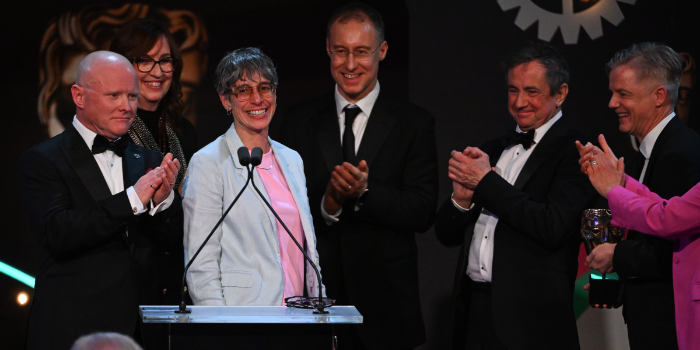
Question from a chap called Nick Tipping: How much – and this might be a very Doug-centric question – How much of an overhead has mixing in Dolby Atmos placed on the team, or has it become the norm, and are you still learning what you can do in the sound space?
Doug Cooper (28:54): It’s kind of become the norm. So I think the last few shows I’ve done have all been in Atmos.
So as long as you prep all your templates to be Atmos-ready, then it’s a small-ish extension of just working in 5.1 and 7.1. I tend not to use loads of objects in mixing, just because I don’t feel like it wins you a great deal in terms of what you’re actually doing with sound. But it does add a bit, this kind of layer of complication to how you meet specs, in terms of limiting and stuff like that. And then when tracks get conformed, because inevitably there’s edits made during the mix, it makes things more complicated then.
Ben Nemes (29:38): Would you say that there are shows, there’s content, there’s genre – that lends itself – and doesn’t – to Atmos? Because I guess if there is, then this is the kind of show that you’d think would?
Doug Cooper (29:50): Well if you’ve got stuff flying around overhead then great, you know, perfect. That definitely helps.
Al Sirkett (29:54): We can work without the objects, because it’s 7.1.4 beds so that we could always have things moving front to back, over your head. Rather than individual, kind of huge theatre cinemas screens, where you do want to drag one single sound through the objects.
I was track laying and everyone was track laying 7.1.4 anyway for all the sound effects, and we’d set up reverb paths and stuff like that so we could lift up, if you’re in the Throne Room and we were doing the verb in there, we could just lift that up. So you always felt like the space was above you as well, not just for single sound effects but for reverb as well.
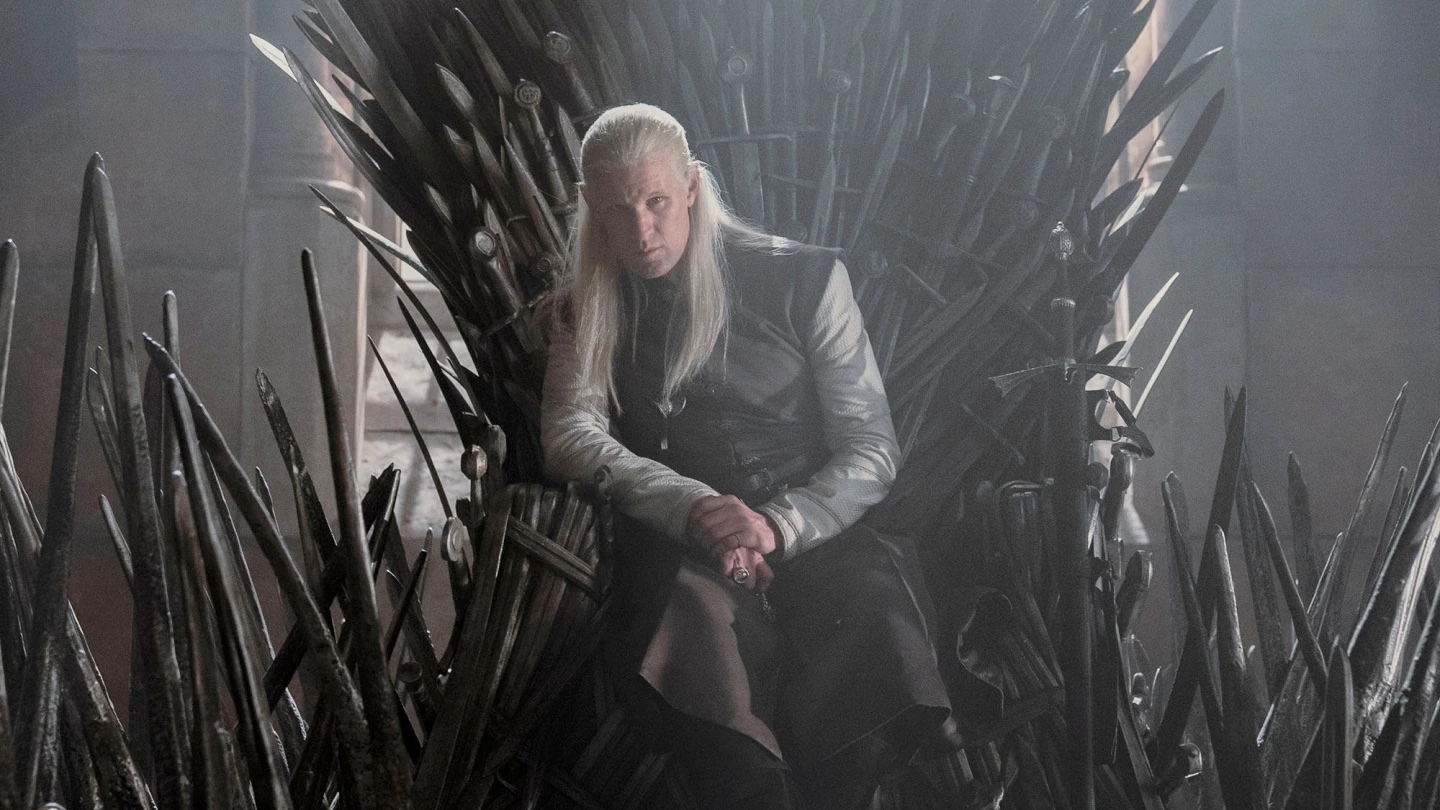
Ben Nemes (30:33): So I guess the answer to Nick’s question is that it doesn’t overly add to the overhead, because you’re thinking about it all the way through the chain. So compared with 7.1 or 5.1, it’s not particularly extra in terms of a workflow overhead because it’s there already?
Doug Cooper (30:53): I think you have to also be conscious then of how that stuff folds back down into 5.1 and stereo. It’s just a question of checking what the fold-down laws are doing to it.
Al Sirkett (31:03): We would both take stuff home, play it on a TV at home and a Sonos setup, and listen to different fold-downs because – as much as it’s great having it in Atmos – not everybody’s gonna do that.
I’ve sat on the tube and seen people listening to it on their ‘phones.
Adele Fletcher: I’ve seen people watching it on a plane.
Al Sirkett: So you do have to take that into consideration. You can’t work to that. We do work for the best sounding room that we can put it in, the mix room. We know how it’s gonna sound.
But yes, you do have to be aware, and it was just going home and folding it down to a stereo, I’d just quickly pop it on my TV in my studio at home. There’s always certain sections that I was worried about that maybe wouldn’t work, something with a bit of punch or stuff like that. You still want to feel like there’s these moments that are going to carry through.
Ben Nemes (31:54): Next question is where do you see A.I. developing, specifically in terms of ADR? It’s kind of a huge, huge topic. Top of your head, any thoughts around that? Particularly on a show where they don’t want to have ADR?
Tim Hands (32:07): There is a thing where you can sample voices..
Ben Nemes (32:12): ..I know the one you mean.
Tim Hands (32:13): …So what I could do as a dialogue editor is, say, some of the background characters – rather than getting cast in like a loop group – which is what I normally do. I say, ‘that guy there, I just need him to say something as these people are walking past, you see his mouth moving’. So I could record something and I could use this software to put a voice to it, not my own voice, but something else.
And then there’s a lady on the opposite side of the room also doing this stuff and I could record something and put a female voice on my performance, which is great.
There’s one missing link, which is that it relies on the dialogue editor being able to perform something in the first place. And the demo video I saw – with the greatest apologies to anybody out there – get an actor! Because you can’t do it.
I think there was another thing where you could sample the actor’s voices. If you get enough of a recording you could then add a line which might be good for temp screenings? But we’re getting into territory that is very dangerous.
I really do think that we need to put a bit of a a hold on this, because it’s great – there’s some A.I. stuff for cleaning up noisy dialogue is great. But when we start playing with people’s voices, people’s performances. I think we’re getting into a very dangerous territory.
Ben Nemes (33:40): The A.I. conversation across all different disciplines and all different arenas is around that. It’s: that could be really useful, that could really help with some thing.
Tim Hands (33:51): Like, if you have an actor that doesn’t want to do ADR
Adele Fletcher: I was just about to say that.
Some actors would probably love [A.I. tools], because they’ll be like ‘great, don’t need to do ADR!’ But others would say, ‘No, that ruins my performance’.
Adele Fletcher
Tim Hands: So it’s a very delicate subject. It really needs a lot of thought.
Ben Nemes (34:10): And that’s true of Writers – most relevant right now – as well.
Tim Hands (34:14): We’re getting into unknowns!,
Ben Nemes (34:16): So we all have to go into it with a kind of ‘Yeah…sure..but‘ mentality
Tim Hands (34:22): I mean it’s great, it is great as a tool, like everything else. As a tool – it’s got great potential but also great potential for litigation and problems
Ben Nemes (34:36): Well there’s a fundamental isn’t there? Who owns what? If I am an actor, who owns my voice?
Tim Hands (34:42): Well there is that guy whose voice is doing audio books. He’s been dead, I don’t know how many years, the family sold his voice to the publisher. So he’s still reading audio books. He’s out there somewhere. So it’s dangerous territory. I think we’ve got to be very careful how we handle it.
Ben Nemes (34:59): That’s it for the questions. That’s good.
We have 25 seconds left, which means I’ve done this right.
So it remains only for me to thank you all for being here, and most importantly, to thank our panel for their time.
The Media Production & Technology Show returns to Olympia, London, on the 15th and 16th May 2024.
